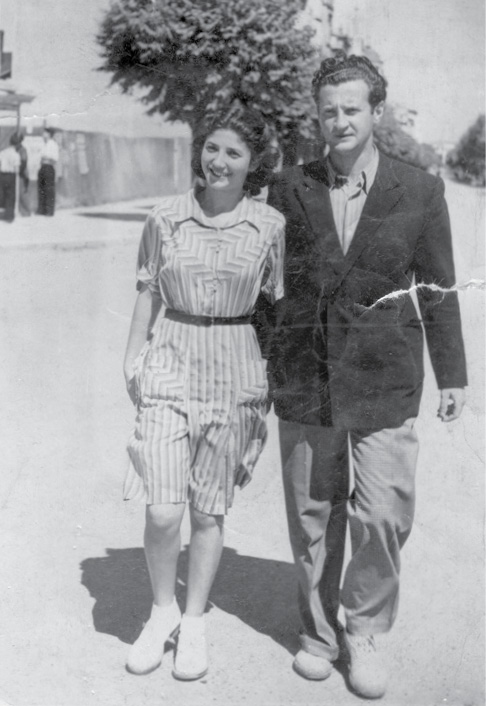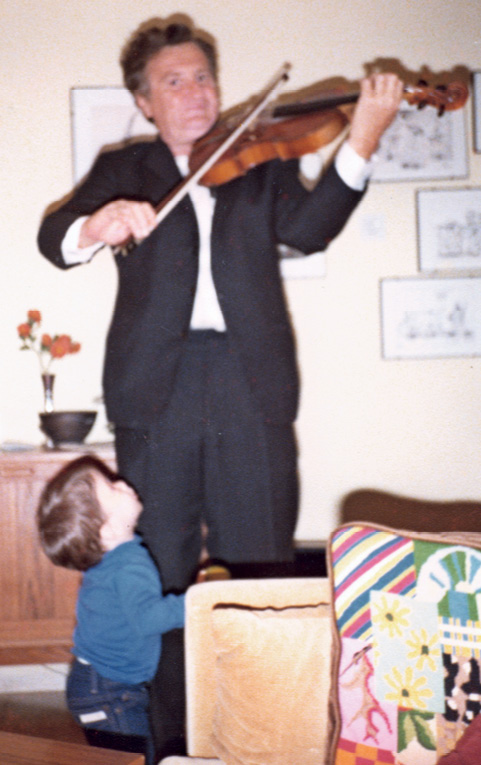
OLD PHOTOGRAPHS
Mati and Moni in Varna, Bulgaria, about 1946, before they emigrated to Israel
As a child, I would watch Savta Mati patiently roll out the dough by hand, spreading each layer with margarine (which is all they used then) before folding and rolling it out again and then repeating. After the dough was rolled out for the third time, she cut it into squares and carefully filled each parcel with potato or cheese. I never had the patience to wait for the borekas to cool once they were out of the oven, so I always burned my mouth.
I was eighteen when I returned to Israel. I had barely finished my freshman year at the University of Vermont, “majoring” in photography while spending most of my time snowboarding or engaged in independent botanical studies. As a sophomore, I had the brilliant idea of going to school part-time so that I would be eligible to move off campus with friends. With no pretense of being a full-time student, things went from bad to worse, and I ended up in the hospital.
I was broken. When my parents suggested I move back to Israel, I said yes. I had no other option. When I arrived, things were very different from the good memories I had of my year at boarding school. There were no American teenagers, freed from their parents’ grip and ready to party. I was living with my mother in Kfar Saba, a small city north of Tel Aviv. I didn’t speak a word of Hebrew. I was an immigrant.
To get out of the apartment, I trudged up and down Weizmann Street every morning, looking for a job that I knew I wouldn’t be qualified for. One morning, as I walked past a bakery with display cases piled high with borekas, my footsteps slowed. A year earlier, as the possibility of a college diploma faded away, I had suggested to my father that we open a boreka shop together. “I don’t care if you want to be a photographer or open a falafel shop,” he told me. “Just stop talking so much shit and do something.”
“That bakery was not full of French chefs in starched whites; it was a band of misfits working their asses off for insane hours.”
I heard my father’s voice in my head as I walked into that bakery on Weizmann Street and asked for a job in broken Hebrew. I fully expected to be sent away, but instead, I was told to show up the next day. I don’t know what I was expecting when I returned, but if I had known that I would be scrubbing sheet pans for eight hours, I probably wouldn’t have gone back. That bakery was not full of French chefs in starched whites making croissants while listening to classical music. It was a band of misfits—Jews and Arabs alike—in torn T-shirts who chased rats around with pizza slicers and worked their asses off in a hot bakery for insanely long hours.
We made borekas in batches so large that it took four of us to lift the block of dough. One baker would run the dough through a series of mechanical rollers, producing sheets that covered a huge prep table. Another baker would follow with a giant accordion slicer to portion the dough into individual pieces; a third baker followed with a piping bag of whatever filling we were using for that batch. My job was to trail behind the third baker, fold the finished borekas, then load them onto sheet trays and roll rack after rack into giant ovens.

CHALLAH
From late Thursday until sundown on Friday, fresh challah shows up at the Machane Yehuda market in Jerusalem, in time for the Sabbath table.
I was the low man on the totem pole. The other bakers called me Shithead or, on good days, Johnny Borekas. Magashim, “sheet pan,” was one of the first Hebrew words I learned. There was always an endless supply of dirty ones to clean. When the bakery was slow, the owner drove me to his house to do yard work. He spoke in Hebrew about the mafiya, bakery, but I heard the Italian word and was convinced he was asking me to do something illegal.
Early on, the other bakers discovered my father was Bulgarian. To them, this meant I had a strong work ethic. For some reason, I didn’t want to disappoint them with the truth: my history of quitting when things got too difficult. Maybe I sensed that this was a chance to remake myself into someone I could be proud of. I felt cleansed by the hard, physical work, and I enjoyed the camaraderie among men who shared this secret. On our breaks, we’d sit around eating pastries, drinking sweet coffee, and smoking. This was my first taste of the bond that is formed among cooks. It is the exact feeling I still get after a busy Saturday night service at Zahav—a sense of pride in myself and in the cooks who stand with me shoulder to shoulder. When I look back at my time at the bakery, it’s hard not to think about the dishwashers who work in my kitchens today. Most of them have made incredible sacrifices to come to this country and do the jobs that no one else wants to do, all to make a better life for their children. It is the story of America, and it is the story of Israel and of my grandparents, too.
“Working in that bakery, I thought about my grandmother often. I loved that I was making borekas for a living.”
Before World War II, my grandparents were upper-middle-class Bulgarian citizens. Grandmother Mati was a pharmacist, and Grandfather Moni taught music and was first violinist with the Varna Philharmonic. In early 1943, the Bulgarian government agreed to authorize the deportation of Bulgaria’s Jews to concentration camps in German-occupied Poland. Through the heroic efforts of Bulgarian politicians and the Bulgarian church, the orders were halted on the eve of the deportation. The trains, which were literally waiting in the station, left Bulgaria empty, sparing the lives of more than 48,000 Jews, including my grandparents.

BOREKAS
Before my grandparents and other Eastern Europeans arrived in the mid-1940s, borekas were not known in Israel. Now they’re sold everywhere.
In order to pacify the Germans, the Bulgarians removed their Jewish male citizens to labor camps to wait out the war. Women and children were sent from the cities to stay out of sight. My grandfather was too young for the camps, but he went anyway. Often, he would escape to the countryside to visit his girlfriend (my grandmother) and then sneak back into the camp. Looking at pictures, it’s difficult to tell which were the laborers and which were the guards. After the war, nearly all of Bulgaria’s Jews were swept up in a wave of Zionism and emigrated to Israel. In Varna, the departing Jews were escorted to the harbor by their fellow citizens. Together they sang the Bulgarian national anthem and cried their farewells.
My father was two years old in 1948, when his parents made the journey from Bulgaria to Israel. Small and fragile as a baby, as their ship arrived in the Jaffa harbor, he was fighting such a dangerously high fever that my grandparents feared he wouldn’t make it. As soon as the boat reached port, he was whisked away for medical treatment. All my grandparents knew was that he was in a hospital in Haifa, 100 miles away. They spoke no Hebrew and no English. They had no money; no idea what to do. My grandfather borrowed the equivalent of two dollars for bus fare and went to Haifa, walking from hospital to hospital looking for his son. He was leaving the children’s ward at one hospital when he heard the faint word tatka, “father” in Bulgarian, from across the room. My two-year-old dad had recognized his father.
My grandparents settled in an agricultural community, a moshav, called Tzur Moshe, near Netanya. The moshav was founded in 1937 by twenty Greek immigrants and was now home to several hundred Greeks, Turks, and Bulgarians. My grandmother was a licensed pharmacist, but since she didn’t speak Hebrew, she couldn’t practice yet. Until she got her license, she earned a living raising chickens and picking tomatoes. My grandfather was an accomplished musician, but a Bulgarian immigrant didn’t stand a chance with the Israel Philharmonic. He found work as a carpenter in an orange-packing plant and pulled overnight shifts as a security guard at the moshav. Life was difficult for my grandparents during their early years in Israel, especially for my grandfather, who had been used to a European way of life. His hands would swell up so severely from building orange crates that he could barely make a fist, let alone play the violin. My dad says it drove my grandfather crazy, and he died when I was six. The only real memory I have is a picture: He’s playing the violin; I’m eating French toast.
After a few years on the moshav, my grandparents, my father, and my aunt moved into a two-room house in Lod, near Tel Aviv, with my great-grandparents and great-great-grandmother. Israel was poor in those days, and food rationing was a fact of life in the years between 1949 and 1959. As a boy, my father thought a sandwich was bread dipped in oil and seasoned with salt and paprika. There were no ovens. Cooking was done on paraffin burners or over wood fires. My great-grandmother made her own pasta, spreading huge sheets of dough on the bed, then cutting it into noodles that would dry all over the house. My great-grandfather made homemade pickles and wine from his own vines, brining and stuffing the grape leaves. Meat was scarce. My great-great-aunt’s husband worked at the local kosher slaughterhouse. Every Friday, the workers would get a package of meat to take home for Shabbat. Often it was beef liver, which my great-grandmother would use to make red soup. My great-grandparents raised their own chickens, but the family only ate those that died, since they couldn’t be sold. The same was true for broken eggs.

SWEETEST SOUND
The only real memory I have of my Bulgarian grandfather, Moni, is this picture. He’s playing the violin, I’m eating French toast.
Fruit was rare. A bucket of guavas could be sold on the streets of Tel Aviv for more than a week’s wages. My father remembers Friday afternoons at his grandparents’ house in Lod as the family (and the whole country) put down their tools and welcomed Shabbat. My great-grandmother would serve him black coffee and watered-down arak, the anise-flavored alcoholic drink, with mezze like hard-boiled eggs, Bulgarian cheese, pickles, and homemade caviar—Tarama (see recipe).
Around the time of my father’s bar mitzvah, his parents moved to their own home in Lod. Some of my most vivid childhood memories include visits to their tiny apartment where, in the late afternoons, you could smell kitchens coming alive all over the crowded building. The perfume of tomatoes, garlic, and paprika cooking together poured from every window; this smell will forever remind me of my Savta Mati.
Years later, when I was working in that bakery, I thought about my grandmother often. I loved that I was making borekas for a living, proud to be part of a tradition that she had brought with her from Bulgaria. And I loved working in a place that was so much a part of daily life in Israel. On Friday mornings, we would arrive at 2 a.m. to start baking, mixing giant batches of challah dough that we’d braid into loaves that would soon grace Shabbat tables in every home in the village. When I came back to Israel, I had nothing. But when I left the bakery a year later, I felt that I had a home.